
Fontes Linguae Vasconum
Scope & Guideline
Fostering Collaborative Dialogue in Linguistics
Introduction
Aims and Scopes
- Linguistic Analysis of Basque:
The journal publishes research focusing on the phonology, syntax, semantics, and morphology of the Basque language, contributing to a deeper understanding of its structure and function. - Cultural and Historical Studies:
Articles often explore the historical contexts of the Basque language, including its evolution, etymology, and presence in literature, thereby enriching the cultural narratives surrounding the language. - Sociolinguistics and Language Ideologies:
Research examining the sociolinguistic dynamics of Basque, including language attitudes, identity, and the impact of societal factors on language use, is a core focus, reflecting the complex relationship between language and culture. - Revitalization and Pedagogy:
The journal emphasizes studies that address the revitalization of the Basque language, exploring educational practices and beliefs surrounding language teaching, particularly in pre-service teacher education. - Interdisciplinary Approaches:
Fontes Linguae Vasconum encourages interdisciplinary research that intersects with fields such as feminist studies, literary analysis, and history, broadening the scope of Basque studies.
Trending and Emerging
- Language and Identity:
Recent studies increasingly focus on the intersection of language and identity, particularly among pre-service teachers and youth, reflecting a growing interest in how language shapes personal and social identities. - Sociolinguistic Dynamics in Education:
There is a notable increase in research examining beliefs about linguistically sensitive teaching and the sociolinguistic environments of Basque learners, highlighting the importance of educational settings in language revitalization. - Feminist Perspectives in Literature:
The integration of feminist critiques and perspectives in Basque literature is gaining traction, indicating a broader trend towards examining gender dynamics within literary contexts. - Analysis of Modern Media and Communication:
Emerging themes related to the analysis of Basque in modern media, such as video games and comics, reflect a contemporary approach to understanding language use in diverse contexts. - Interdisciplinary Studies on Language Revitalization:
Research that incorporates interdisciplinary approaches to language revitalization, including sociocultural, historical, and educational perspectives, is on the rise, signaling a holistic view of language preservation efforts.
Declining or Waning
- Historical Linguistics of Ancient Basque:
Research on ancient Basque inscriptions and historical linguistics, while still present, has seen a decrease in frequency, indicating a potential shift towards contemporary linguistic studies and applications. - Traditional Dialect Studies:
Although dialect studies remain relevant, the emphasis on traditional dialects and their nuances has diminished, as researchers increasingly focus on broader sociolinguistic issues and language use in modern contexts. - Literary Criticism of Classical Texts:
The focus on classical Basque literature and its criticism appears to be waning, possibly overshadowed by contemporary literary analyses and the exploration of modern narratives. - Etymological Studies:
While etymological research is still published, the volume has decreased, suggesting a possible saturation of the topic or a shift towards more applied linguistics and sociolinguistic research.
Similar Journals
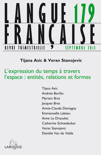
LANGUE FRANCAISE
Elevating Scholarly Dialogue on LinguisticsLANGUE FRANCAISE, published by LAROUSSE, stands as a premier journal in the realm of linguistics and language studies, boasting an impressive Q1 quartile rating in the 2023 Linguistics and Language category. With its international reputation anchored in France, this journal presents critical research and discussions that advance our understanding of the French language, its structures, usage, and evolution. Although not an open-access publication, LANGUE FRANCAISE is indexed with an ISSN of 0023-8368 and an E-ISSN of 1957-7982, reflecting its scholarly credibility and impact, including Scopus rankings that place it competitively in the fields of arts and humanities as well as social sciences. This journal serves as an essential resource for researchers, practitioners, and students aiming to deepen their knowledge and engage in scholarly debates that shape contemporary linguistic thought. The journal's commitment to high-quality research continues to foster an enriching academic environment and contribute to the dynamic discourse surrounding language and linguistics.
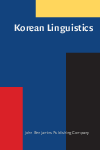
Korean Linguistics
Innovating Perspectives on Korean Linguistic StudiesKorean Linguistics is a premier scholarly journal dedicated to the exploration and advancement of the field of linguistics, with a specific focus on the Korean language and its various dimensions. Published by John Benjamins Publishing Co., this journal is a vital resource for researchers, linguists, and students seeking to deepen their understanding of Korean linguistics and its contextual significance. With an ISSN of 0257-3784 and an E-ISSN of 2212-9731, Korean Linguistics has gained recognition for its rigorous peer-reviewed articles and contributions to the academic community, evidenced by its current ranking in the third quartile (Q3) of the Linguistics and Language category. The journal aims to foster scholarly dialogue and disseminate innovative research methodologies, theoretical advancements, and empirical studies spanning from 2022 to 2024. Although it does not operate under an open access model, its impact on the understanding of Korean linguistics remains significant, making it an essential publication for anyone keen to engage with contemporary issues and developments in this specialized field.

Lingue e Linguaggio
Fostering Insights in Linguistics and Language StudiesLingue e Linguaggio, published by SOC ED IL MULINO, is a distinguished academic journal in the field of Linguistics and Language, hailing from Bologna, Italy. With an esteemed Q2 ranking in its category as of 2023, this journal is recognized for its contributions to both the arts and humanities as well as social sciences, achieving notable positions within Scopus rankings. It serves as a vital platform for researchers, practitioners, and students interested in exploring various linguistic phenomena, language dynamics, and theoretical frameworks. Although it operates under a traditional subscription model rather than open access, its comprehensive array of studies and publications provides significant insights and fosters academic discourse. With a publication period extending from 2002 to 2024, Lingue e Linguaggio continues to be a key resource for advancing the understanding of language in contemporary contexts.
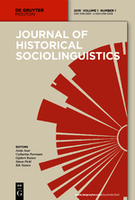
Journal of Historical Sociolinguistics
Connecting Historical Contexts to Linguistic ChangeThe Journal of Historical Sociolinguistics is a distinguished publication focusing on the intricate relationships between language and society from a historical perspective. Published by WALTER DE GRUYTER GMBH in Germany, this journal (ISSN: 2199-2894, E-ISSN: 2199-2908) is recognized for its rigorous scholarship, ranking in the Q2 quartile in Linguistics and Language (2023), highlighting its relevance and impact within the academic community. With Scopus rankings placing it at #326/1088 in Arts and Humanities and #386/1167 in Social Sciences, this journal is essential for researchers and scholars interested in the dynamics of language evolution, sociolinguistic shifts, and historical context. Through its insightful articles and contributions, the journal aims to illuminate the nuanced interplay between linguistic change and social factors over time, making it an invaluable resource for students, professionals, and academics alike. The journal operates under an open-access model, ensuring that knowledge is disseminated widely and freely accessible to those engaged in the cutting-edge studies of sociolinguistics.

Rasprave
Catalyzing insights in the field of linguistics and sociolinguistics.Rasprave is a distinguished open access journal published by the Institute of Croatian Language and Linguistics in Croatia, dedicated to advancing the field of linguistics and language studies. With an ISSN of 1331-6745 and E-ISSN 1849-0379, the journal has embraced open access since 2007, making its research widely available to scholars globally. It holds an important position in the academic community, particularly noted for its 2023 Scopus ranking within the Arts and Humanities and Social Sciences categories, falling into the 59th and 56th percentiles respectively. The journal’s impact is further reflected in its Q3 quartile ranking in linguistic and language studies, showcasing its relevance and growing influence in this vibrant field. Rasprave aims to publish innovative research that deepens understanding of language dynamics, linguistic theory, and sociolinguistics, making it an essential resource for researchers, professionals, and students seeking to enrich their knowledge and contribute to the academic discourse surrounding language.

Catalan Journal of Linguistics
Fostering Innovation in Linguistic Research since 2002.Catalan Journal of Linguistics is a distinguished academic publication dedicated to the dynamic field of linguistics and language studies. Published by the Universitat Autònoma de Barcelona, this open-access journal has been disseminating impactful research since 2002, making significant contributions to the understanding of linguistic theory, language acquisition, and sociolinguistics, particularly within the Catalan language context. With a robust engagement in the scholarly community, it proudly holds a Q2 ranking in Linguistics and Language as of 2023, reflecting its commitment to high standards of research and innovation. The journal is accessible to a global audience, promoting the free exchange of knowledge beyond geographical boundaries, and serves as an essential platform for researchers, professionals, and students aiming to stay at the forefront of linguistic inquiry. With its rich archive of articles, the Catalan Journal of Linguistics stands as a vital resource for anyone keen to explore contemporary linguistic issues and advancements.
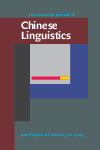
International Journal of Chinese Linguistics
Connecting Scholars in the Realm of Chinese LanguageInternational Journal of Chinese Linguistics is a distinguished publication that delves into various aspects of linguistic studies pertaining to the Chinese language. Published by John Benjamins Publishing Co, this journal stands out for its commitment to advancing the knowledge and understanding of Chinese linguistics within the global academic community. With an impact factor that places it in the Q2 quartile of linguistics and language, the journal is indexed in prominent databases, achieving ranks of #501 in Arts and Humanities and #580 in Social Sciences. These rankings reflect the journal's dedication to maintaining high scholarly standards and its relevance in both linguistic research and practical applications. While not categorized as Open Access, the journal provides necessary access through institutional subscriptions, thereby ensuring that valuable research reaches a broad audience. Covering a wide range of topics from syntax and phonetics to sociolinguistics and applied linguistics, the International Journal of Chinese Linguistics serves as an essential resource for researchers, professionals, and students seeking to deepen their understanding of the intricate relationship between language and culture in the Chinese context. With converging years from 2019 to 2024, it continues to evolve, reflecting ongoing developments in the field.

Al-Arabiyya-Journal of the American Association of Teachers of Arabic
Empowering Arabic Education through Innovative ResearchAl-Arabiyya: Journal of the American Association of Teachers of Arabic, published by Georgetown University Press, serves as a significant platform for research and scholarship in the fields of Arabic language education, linguistics, and literature. With its ISSN 0889-8731 and E-ISSN 2375-4036, this journal presents a robust blend of original articles, reflections, and pedagogical research aimed at both seasoned educators and emerging scholars. While the journal is not an open-access publication, it maintains a commendable impact in its categories, achieving Q4 in Education and Q2 in Literature and Literary Theory as per the latest rankings. Notably, it has been recognized within Scopus for its contributions to the arts and humanities, with rankings that reflect a vibrant academic discourse surrounding the Arabic language. Al-Arabiyya aims to promote and enhance the teaching and learning of Arabic while fostering an understanding of its literary and cultural richness, making it an invaluable resource for anyone interested in Arabic studies.
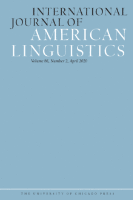
INTERNATIONAL JOURNAL OF AMERICAN LINGUISTICS
Pioneering Research in the Dynamics of Language.The INTERNATIONAL JOURNAL OF AMERICAN LINGUISTICS, published by University of Chicago Press, is a revered scholarly publication dedicated to the exploration and advancement of linguistic studies, particularly those related to the American linguistic landscape. With an ISSN of 0020-7071 and an E-ISSN of 1545-7001, this journal serves as a vital platform for researchers, professionals, and students interested in the nuances of language, dialects, and linguistic structures through rigorous academic inquiry. The journal has established a commendable impact, reflected in its ranking within the Q2 category in Linguistics and Language and its placements in the Scopus rankings, thereby positioning itself within the 50th to 53rd percentile of its respective fields. While the journal does not provide Open Access options, it continues to be a cornerstone resource for those seeking to expand their understanding of American linguistics, already converging from 1996 to 2024. Through its continued commitment to excellence, this publication remains essential for those aiming to contribute significantly to the field.

Sprache & Sprachen
Engaging Minds in the Dynamic World of LanguageSprache & Sprachen is a renowned academic journal published by the Gesellschaft Sprache & Sprachen Gesus EV, focusing on the dynamic field of linguistics and language studies. With an ISSN of 0934-6813 and an E-ISSN of 2199-6016, this journal serves as a valuable platform for researchers and scholars to share innovative research, theoretical frameworks, and empirical studies related to language usage, structure, and evolution. Though it currently does not operate under an Open Access model, it maintains a robust reputation within the academic community, contributing significantly to ongoing discussions in linguistics. The journal's objective is to foster interdisciplinary collaboration and provide a forum for diverse linguistic perspectives, making it an essential resource for professionals and students alike who are keen on advancing their understanding of language phenomena. Located in Wuppertal, Germany, Sprache & Sprachen aims to engage the global academic audience by disseminating critical insights and encouraging scholarly discourse.